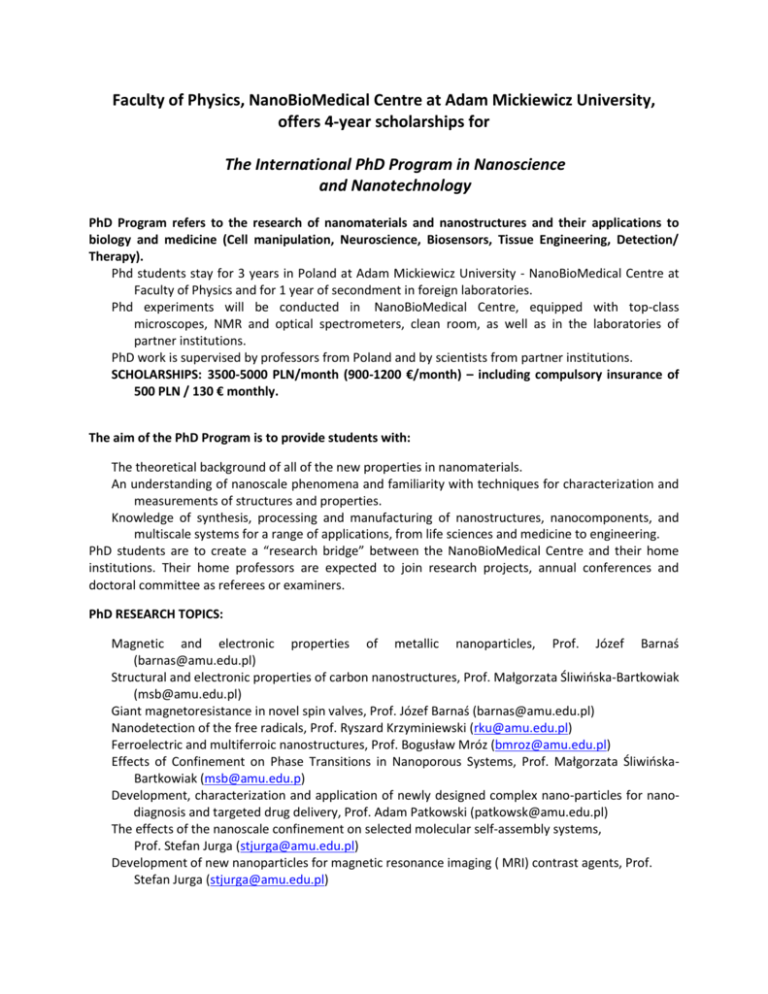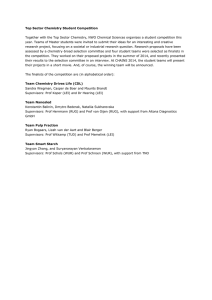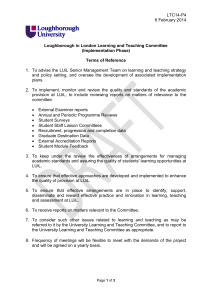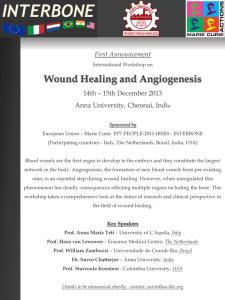Faculty of Physics, NanoBioMedical Centre at Adam Mickiewicz
advertisement

Faculty of Physics, NanoBioMedical Centre at Adam Mickiewicz University, offers 4-year scholarships for The International PhD Program in Nanoscience and Nanotechnology PhD Program refers to the research of nanomaterials and nanostructures and their applications to biology and medicine (Cell manipulation, Neuroscience, Biosensors, Tissue Engineering, Detection/ Therapy). Phd students stay for 3 years in Poland at Adam Mickiewicz University - NanoBioMedical Centre at Faculty of Physics and for 1 year of secondment in foreign laboratories. Phd experiments will be conducted in NanoBioMedical Centre, equipped with top-class microscopes, NMR and optical spectrometers, clean room, as well as in the laboratories of partner institutions. PhD work is supervised by professors from Poland and by scientists from partner institutions. SCHOLARSHIPS: 3500-5000 PLN/month (900-1200 €/month) – including compulsory insurance of 500 PLN / 130 € monthly. The aim of the PhD Program is to provide students with: The theoretical background of all of the new properties in nanomaterials. An understanding of nanoscale phenomena and familiarity with techniques for characterization and measurements of structures and properties. Knowledge of synthesis, processing and manufacturing of nanostructures, nanocomponents, and multiscale systems for a range of applications, from life sciences and medicine to engineering. PhD students are to create a “research bridge” between the NanoBioMedical Centre and their home institutions. Their home professors are expected to join research projects, annual conferences and doctoral committee as referees or examiners. PhD RESEARCH TOPICS: Magnetic and electronic properties of metallic nanoparticles, Prof. Józef Barnaś (barnas@amu.edu.pl) Structural and electronic properties of carbon nanostructures, Prof. Małgorzata Śliwińska-Bartkowiak (msb@amu.edu.pl) Giant magnetoresistance in novel spin valves, Prof. Józef Barnaś (barnas@amu.edu.pl) Nanodetection of the free radicals, Prof. Ryszard Krzyminiewski (rku@amu.edu.pl) Ferroelectric and multiferroic nanostructures, Prof. Bogusław Mróz (bmroz@amu.edu.pl) Effects of Confinement on Phase Transitions in Nanoporous Systems, Prof. Małgorzata ŚliwińskaBartkowiak (msb@amu.edu.p) Development, characterization and application of newly designed complex nano-particles for nanodiagnosis and targeted drug delivery, Prof. Adam Patkowski (patkowsk@amu.edu.pl) The effects of the nanoscale confinement on selected molecular self-assembly systems, Prof. Stefan Jurga (stjurga@amu.edu.pl) Development of new nanoparticles for magnetic resonance imaging ( MRI) contrast agents, Prof. Stefan Jurga (stjurga@amu.edu.pl) Nanomaterials applied for drug delivery systems and tissue engineering, Prof. Stefan Jurga (stjurga@amu.edu.pl) Nanostructures for manipulation and treatment of biological objects, Prof Michael Giersig (giersig@amu.edu.pl) Novel nanonetworks for contolled growth of neurons, Prof Michael Giersig (giersig@amu.edu.pl) Detection of biomolecules by means of nanoparticles/nanostructures, Prof Michael Giersig (giersig@amu.edu.pl) Biochemical reactions in crowded complex systems and in living cells, Prof. Adam Patkowski (patkowsk@amu.edu.pl) New cell scaffolds for tissue engineering, Prof Michael Giersig (giersig@amu.edu.pl) Generation of „nano-vaccines“ – loading of nano carriers with protein and DNA for specific functional targeting of immune cells in vitro and in vivo, Prof. Andrzej Mackiewicz (andrzej.mackiewicz@wco.pl) Development of vector nanodelivery systems for transgenesis, Prof. Ryszard Słomski (slomski@up.poznan.pl) Nanoparticles based monitoring of the presence and expression for transgenes for pharmaceutical purpose, Prof. Ryszard Słomski (slomski@up.poznan.pl) Structure, dynamics and interactions of membranes, Prof. Adam Patkowski (patkowsk@amu.edu.pl) Next-Generation Sequencing – new diagnostics platform for studies of polygenic diseases, Prof. Ryszard Słomski (slomski@up.poznan.pl) PARTNER INSTITUTIONS: Freie Universität Berlin: Prof. Paul Fumagalli, Prof. Michael Giersig, Prof. Stephanie Reich www.physik.fu-berlin.de Carnegie Melon University, USA: Prof. Krzysztof Matyjaszewski, www.cmu.edu Max-Planck-Institute for Colloids, Golm/Berlin, Germany: Prof. Markus Anonietti, www.mpikggolm.mpg.de University of Cambridge, UK: Prof. Jacek Klinowski, www.ch.cam.ac.uk University of Michigan, USA: Prof. Nicolaus Kotov, www.engin.umich.edu University of Vigo, Spain: Prof. Luis Liz-Marzan, www.uvigo.es University of Liverpool, UK: Prof. Mathias Brust, www.liv.ac.uk University Duisburg-Essen, Germany: Prof. Michael Farle, www. farle.uni-due.de FORTH, Heraklion, Greece: Prof. Dmitris Vlassopoulos, www.ics.forth.gr Research Center Jülich, Germany: Prof. Jan Dhont, www.fz-juelich.de Boston College, USA: Prof. Kris Kempa, www.physics.bc.edu Tsukuba Research Center for Interdisciplinary Materials Science (TIMS), Ibaraki, Japan: Prof. Toru Yoshitomi, www.tims.tsukuba.ac.jp North-Carolina State University, USA: Prof. Keith Gubbins, www. chumba.che.ncsu.edu Bonn University, Germany: Prof. Andreas Limmer, www.uni-bonn.de University of Hongkong: Prof. Kwong Chan, www.hku.hk University of Bilbao, prof. J.M. Perez Mato, Prof. T. Breczewski, www.bilbao.university-guides.com ADMISSION REQUIREMENTS: A master’s degree – or M.Sc. equivalent - in science (e.g. physics, biology, chemistry, medicine, biophysics) or engineering field, obtained not earlier than in 2005. Diploma must be with the grade at least good (or equivalent). Fluent knowledge of English. DOCUMENTS TO BE SUBMITTED 1. Official transcripts of an M. Sc. Diploma together with a detailed list of all courses taken. 2. Final diploma in attended faculty, obtained not earlier than in 2005. 3. Two letters of recommendation, written by individuals (i.e. Tutor/ Referee). Letters should point the applicant’s suitability for a PhD program. 4. A letter of intent (maximum two A4 pages) that presents previous research achievements, participation in conferences and seminars, publications, professional goals and motivation for joining “The PhD program in Nanoscience and Nanotechnology”, suitability for the program, and career goals. 5. Optionally: certificates confirming advanced knowledge in English (e.g. CAE or TOEFL). 6. Application form. The documents may be submitted by post or by email. Hard copies of all official documents should be supplied by the interview day. ADMISSION PROCEDURE (May- June 2010 and January-March 2011) 1) application reviewing 2) interview - held at NanoBioMedical Centre at Adam Mickiewicz University, in Poznan. For candidates from abroad a teleconference will be organized if necessary. ABOUT THE UNIVERSITY: Adam Mickiewicz University (AMU) in Poznan is one of the leading Polish universities that serves 47,000 students who can choose from over 250 Master and PhD programmes. Poznan is a thriving city, situated only 300 km west of Warsaw (capital city) and 240 km east of Berlin (Germany). Over 120 thousands of students stay here and enjoy the academic atmosphere. CONTACT: Prof. Stefan Jurga Director of NanoBioMedical Centre, ul. Umultowska 85, 61-614 Poznan, Poland phone/fax: +48 61 8295157 e-mail: cnbm@amu.edu.pl, www.mpd-cnbm.amu.pl







